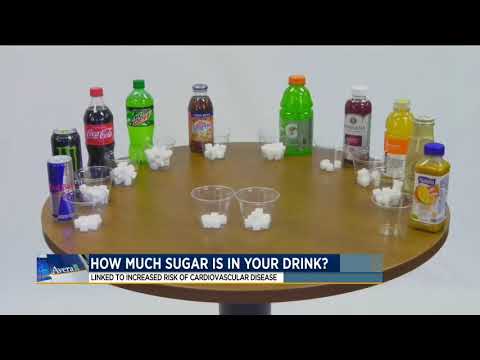How Much Sugar Is in a Sports Drink?
Contents
A new study has found that sports drinks contain more sugar than people realize.
Checkout this video:
Introduction
You may think that because sports drinks are marketed to athletes, they must be good for you. However, many sports drinks are loaded with sugar and calories, which can contribute to weight gain.
How much sugar is in a sports drink?
The amount of sugar in a sports drink can vary depending on the brand and the size of the drink. For example, a 20-ounce bottle of Gatorade Thirst Quencher Sports Drink contains 34 grams of sugar, while a 20-ounce bottle of Powerade Ion4 Sports Drink contains 50 grams of sugar.
To put this into perspective, a can of Coca-Cola contains 39 grams of sugar. So, a 20-ounce bottle of Gatorade or Powerade contains almost as much sugar as a can of Coke.
Why is there so much sugar in sports drinks?
The high sugar content in sports drinks is designed to help athletes replenish glycogen stores after strenuous exercise. Glycogen is the form of carbohydrate that is stored in the muscles and liver and is used for energy during exercise.
When you exercise at a high intensity for more than an hour, your body starts to deplete glycogen stores. This can lead to fatigue and decreased performance. Consuming sugar during or after exercise can help replenish glycogen stores and improve performance.
However, if you’re not an athlete or if you’re not exercising at a high intensity for more than an hour, you don’t need to replace glycogen stores. And, if you’re not an athlete or if you don’t exercise regularly, the extra calories from the sugar in sports drinks can contribute to weight gain.
How much sugar should you consume per day?
The American Heart Association (AHA) recommends that women consume no more than 6 teaspoons (24 grams) of added sugars per day and men consume no more than 9 teaspoons (36 grams) of added sugars per day. Yet, many people consume far more than this recommendation. In fact, the average American consumes about 22 teaspoons (88 grams) of added sugars per day.
The Different Types of Sports Drinks
Sports drinks are designed to replace the electrolytes lost during exercise, but they also contain carbohydrates and sugar. The amount of sugar in a sports drink varies depending on the type of drink, with some containing more sugar than others.
Isotonic drinks are the most common type of sports drink, and they contain 6-8% sugar. This is similar to the sugar concentration of human blood, so isotonic drinks are absorbed by the body quickly and efficiently.
Hypotonic drinks have a lower concentration of sugar, usually 3-4%. This makes them ideal for use before or during exercise, as they won’t cause an energy spike followed by a crash. However, because they are absorbed more slowly, hypotonic drinks are not as effective at replacing lost electrolytes.
Hypertonic drinks have a higher concentration of sugar, typically 8-10%. This makes them ideal for use after exercise, when the body is trying to replenish its glycogen stores. However, hypertonic drinks can cause bloating and stomach discomfort if consumed during exercise.
The Amount of Sugar in Sports Drinks
Sports drinks are often marketed as a healthy way to rehydrate and replenish electrolytes lost during exercise. However, many of these drinks are loaded with sugar and calories, which can actually do more harm than good.
Depending on the brand and size, a single sports drink can contain anywhere from 5 to 34 grams of sugar. That’s the equivalent of 1 to 8 teaspoons of sugar! And if you’re drinking more than one per day, or using them as a daily replacement for water, you could be consuming far more sugar than you realize.
In addition to the sugar content, many sports drinks also contain high levels of sodium and other electrolytes. While this can be beneficial for athletes who are sweating profusely, it’s not necessary for the average person. In fact, too much sodium can actually cause dehydration.
So, how much sugar is in a sports drink? It depends on the brand and size, but it can be quite a lot! If you’re looking for a healthy way to rehydrate, stick to plain water or unsweetened tea instead.
The Effects of Sugar on the Body
Sugar is a simple carbohydrate that is found in many foods and drinks. It is also a common ingredient in sports drinks. When you consume sugar, it is broken down into glucose and fructose, which are then absorbed into the bloodstream.
Your body responds to the presence of sugar in the blood by releasing insulin, which helps to regulate blood sugar levels. Insulin helps to move sugar from the blood into the cells, where it is used for energy.
If you consume too much sugar, or if your body does not use all of the sugar that is present in the blood, it can lead to elevated blood sugar levels. Over time, this can increase your risk for developing type 2 diabetes.
In addition to its effects on blood sugar levels, sugar can also cause weight gain and tooth decay. Sugar is high in calories, and when consumed in excess, it can lead to weight gain. Sugar can also promote tooth decay by feeding the bacteria that cause plaque.
Conclusion
In conclusion, it is safe to say that sports drinks do contain a fair amount of sugar. However, this is not necessarily a bad thing. The sugar in sports drinks provides energy and electrolytes which can be beneficial for athletes. It is important to remember that everyone is different and that some people may be more sensitive to the sugar in sports drinks than others. If you are concerned about your sugar intake, it is best to speak with a doctor or nutritionist.







